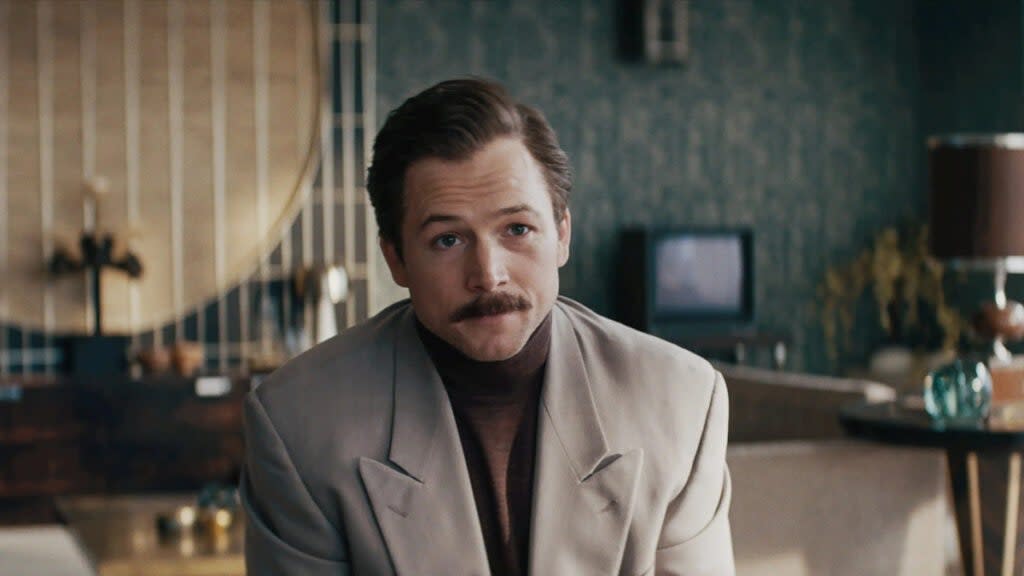‘Tetris’ Review: Taron Egerton Drama Uses Retro Nostalgia to Re-Imagine the True Story of Classic Game

- Oops!Something went wrong.Please try again later.
- Oops!Something went wrong.Please try again later.
There’s a promising and even semi-adult comedy at the heart of “Tetris,” an otherwise corny action-adventure based on the real-life story of how the iconic 1980s computer and video game was licensed outside of Russia. Most of the plot of “Tetris” concerns the political maneuvering and corporate espionage required to smuggle “Tetris,” the iconic brick-laying puzzle game, out of Moscow and away from greedy businessmen.
The lead protagonist of “Tetris” (the movie) also happens to be its main hero, an uncomplicated leading man whose personal motives don’t matter so much as the vague and never credibly represented virtues of “Tetris” (the game). Meet Henk Rogers (Taron Egerton), a fast-talking Dutch-American salesman living and working in Tokyo. Henk needs to license “Tetris” to the Japanese gaming company Nintendo so that his family business, Bullet Proof Software, can survive. Henk also needs to sell “Tetris” to Nintendo so that he can re-pay a massive loan to sell the game’s international licensing for computer, arcade, and video game consoles. If he does not repay his debt, Henk and his wife Akemi (Ayane) will lose their home.
So much depends on Henk’s fast and fervent pitching, but so little seems to matter about him beyond the plot-pushing consequences of his actions. Henk’s a human catalyst who swiftly gets ensnared in a conspiracy of self-interested and obviously dissembling thugs, bullies, and corporate stooges, including cut-throat (and bankrupt) billionaire Robert Maxwell (Roger Allam), his petulant son Kevin Maxwell (Anthony Boyle), and their slimy Russian ally Valentin Trifonov (Igor Grabuzov), the latter of whom also happens to work for the Russian government. Some light beatings, courtesy of Valentin’s KGB lackey Boris (Greg Kolpakchi), ensue and are ostensibly enhanced by a completely bogus romantic/espionage sub-plot involving the mysterious Russian translator Sasha (Sofya Lebedeva).
Henk’s like a third-generation clone of Steven Spielberg’s archetypal day-dreaming dad protagonists. He has to sell “Tetris” to provide for his emotionally estranged family. His domestic ties also tend to be related through emotional short-hand, like how, when Henk does call home his daughter Maya (Kanon Nurumi) begs him to come back in time to see her sing at her first school recital. That’s obviously a tall order given everything else going on in “Tetris.”
Also Read:
‘Tetris’ Trailer: Taron Egerton Takes on Cold War Mission to Bring Video Game to the U.S. (Video)
Much more time is wasted on humanizing—or really, valorizing—Alexey Pajitnov (Nikita Efremov), the stoic and unbelievably selfless creator of “Tetris” who, like Henk, has a family that he’s trying to protect. Alexey’s family are implicitly and none-too-subtly threatened by Valentin and Boris, but Henk seems to speak for the movie’s creators when he mindlessly praises Alexey for being “the only one who stands to gain nothing from this.” Nina (Ieva Andrejevaite), Alexey’s barely developed wife, responds in kind by calling Henk “dumb” but “honest.” Almost none of these qualities are evident in this movie, possibly because the real-life Alexey Pajitnov, as well as Akemi, Henk, and Maya Rogers are credited as executive producers of “Tetris” the movie.
Stefan and Efremov both stand out, and Egerton heroically maintains a high level of table-setting enthusiasm, but everything else about “Tetris” lacks the cornball conviction needed to sell this sort of over-extended humanist drama. Henk may be right when he says that “Tetris,” the game, is “just that good,” but you wouldn’t know it based on “Tetris” the movie.
The most engrossing parts of “Tetris” concern Henk’s tense negotiations with Alexey’s testy but sympathetic boss Nikolai Belikov (Oleg Stefan), whom Henk eventually wears down. Here, the ensemble cast sells the viewer on what the filmmakers otherwise don’t seem so sure about: a convoluted, back-and-forth series of negotiations between Henk and Belikov, who determine, with some help from Alexey and the Maxwells’ representatives, who gets to buy and sell the rights to the “Tetris” game.
The makers of the movie consistently fight against their better impulses whenever they try to find deeper and/or period-specific meaning in their hagiographic drama. Some half-hearted scenes set in and around Moscow try and fail to suggest what life was like in the Soviet Union. For example, at a speakeasy-style party, Henk inanely observes, after seeing a warehouse full of Russians singing along to “The Final Countdown”: “Everybody knows the words. Good ideas know no borders.”
Also Read:
Why Apple TV+’s 40% Subscription Price Hike Is Entirely Justified | Charts
But the same filmmakers repeatedly clobber viewers over the head with curdled nostalgia, especially 8-bit style chiptune sfx and music, including sugary covers of instantly recognizable 1980s pop songs like “I Need a Hero” and the aforementioned “The Final Countdown.” The hyper and instantly wearying soundtrack makes it seem as if the makers of the movie don’t trust their viewers enough to appreciate this story’s distinguishing features.
“Tetris” never settles on a tone or dramatic register. Instead, it pelts viewers with retro pop culture references and Cold War stereotypes, and never slows down long enough to locate the human emotions behind so much slick expository dialogue and paint-by-numbers sentimentality. Hokey and unconvincing, “Tetris” skims the surface of a genuinely curious “true story” thriller, which too often plays out like a Disney-ified version of “The Social Network.”
Also Read:
Amazon Rocks Most In-Demand New Shows List With ‘Daisy Jones,’ ‘The Consultant’ | Chart

